_We may earn revenue from the products available on this page and participate in affiliate programs. Learn more ›
_
Best Automatic
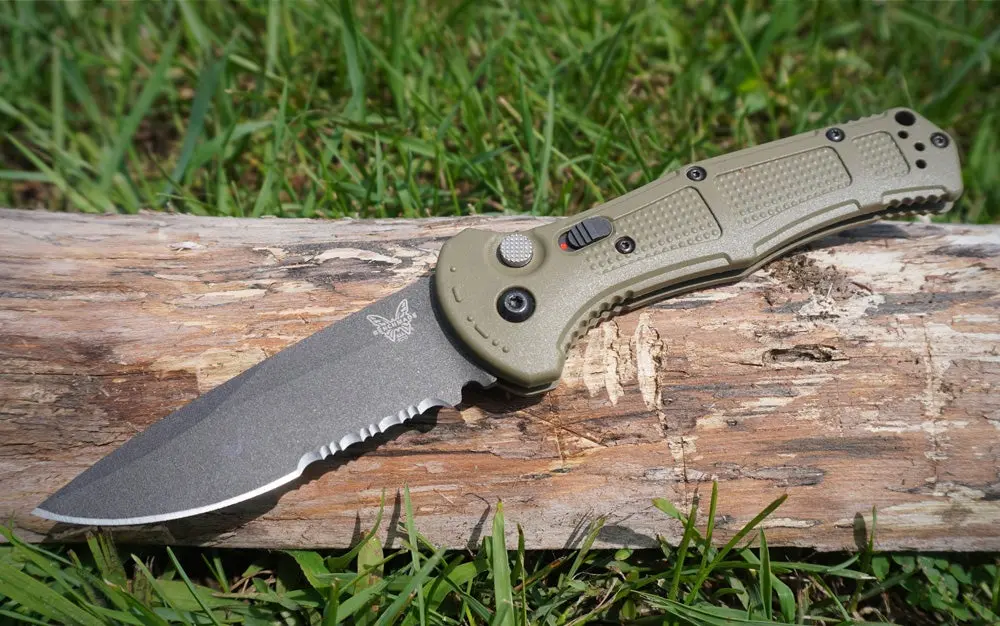
Benchmade Claymore
LEARN MORE
Summary
The Claymore is a rugged, tough knife that opens with an authority that other autos and assisted blades cannot match.
Best Pocket
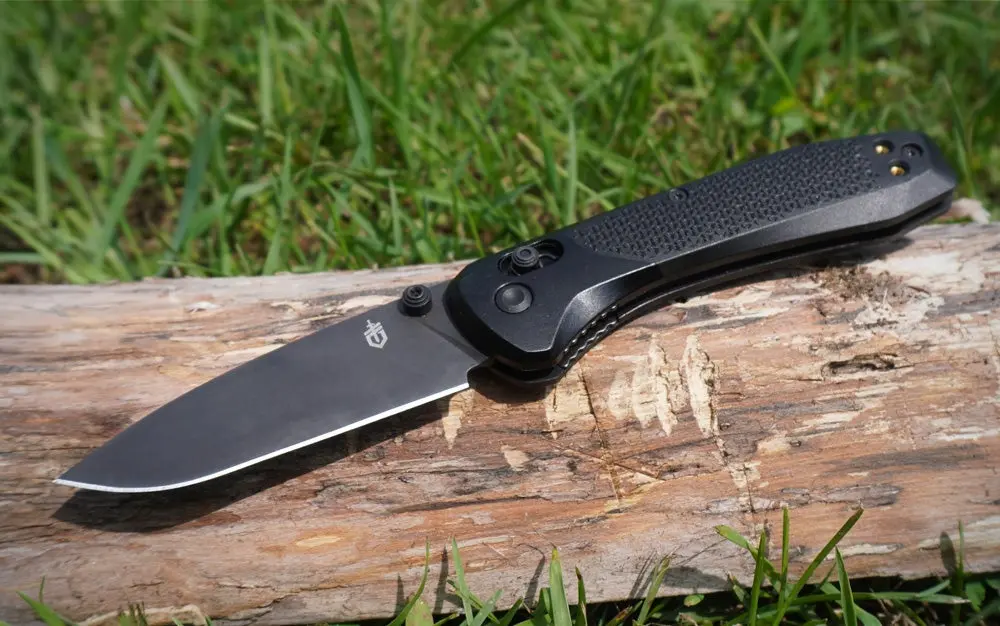
Gerber Sedulo
LEARN MORE
Summary
The Sedulo’s excellent handle, steel quality, and edge retention are a real surprise for a knife of this price point.
Best Fixed Blade
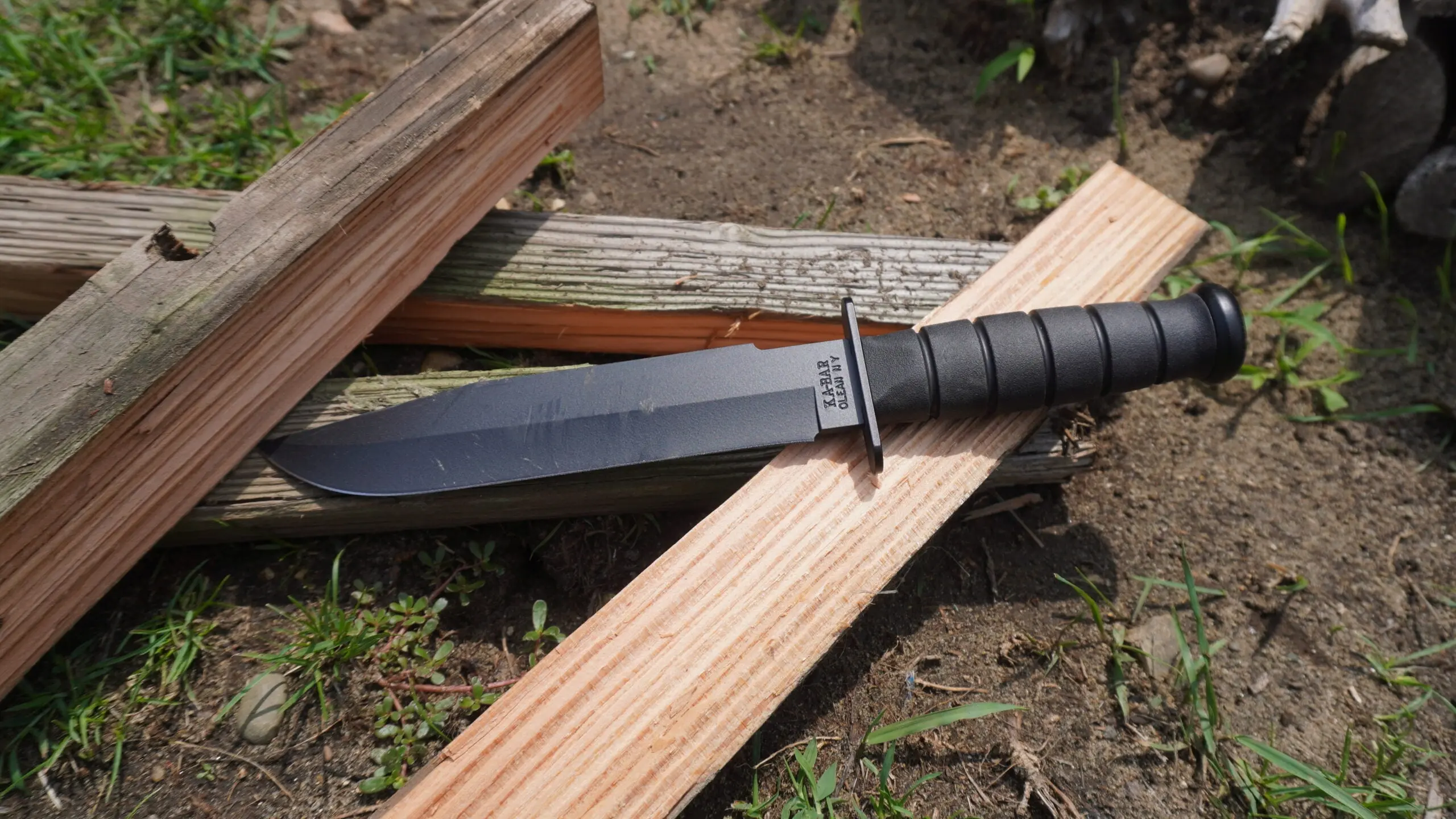
Ka-Bar Fighter
LEARN MORE
Summary
The Ka-Bar upsizes a classic design with a simple plain edge to create a highly functional knife that won’t break the bank.
With more and more people carrying knives daily, tactical knives have exploded in popularity over the last few years. Blades built for combat situations and emergency scenarios are much more rugged and ergonomic than the regular knives being offered by manufacturers. For anyone who wants to use only the best, it’s hard to go wrong with something carried and trusted by military and law enforcement personnel every day.
“Tactical” is a bit of a nebulous term when it comes to knives. Thus, we decided to test a variety of styles for our recommendations. We tested fixed blade knives
, along with assisted opening, folding, and automatic knives
for this piece. With that in mind, these are our picks for the best tactical knives being made today.
Best Automatic: Benchmade Claymore
Best Pocket: Gerber Sedulo
Best Fixed Blade: Ka-Bar Fighter
Best Assisted: CRKT M16
Best Carry: Benchmade Bailout
Best Budget: Reapr Javelin Fixed Blade
Best Made in USA: Benchmade Nimravus
How We Tested the Best Tactical Knives
In the interest of saving time, I subjected all the knives on this list to a series of edge retention tests. While I cut a variety of materials including paracord, paper, wood, and plastic, the main test was ripping cardboard. On the surface that might not seem like a tough test. But cardboard is built from extremely abrasive materials that can quickly dull any knife blade. Just ask any factory worker how many disposable razor blades they go through in a month. Cardboard is one of the toughest tasks you can give any knife, especially if you cut horizontally through the corrugations.
I also subjected the fixed blade knives to a wood splitting test via the batoning method. This helped me better understand the strength and ruggedness of the blade. Afterwards, I inspected the steel for scratches or gouges that might be permanent.
Additionally, I evaluated the following factors while making my decisions:
Grips: How ergonomic is the texture? Are there any uncomfortable parts of the design? Is my hand prone to slipping?
Sheaths: If the knife includes a sheath, how good is the quality? Is it rugged enough for extreme survival scenarios?
Mechanisms: How crisp are the folding functions, flippers, or buttons for folding knives? How quickly does the blade deploy? How tight are the tolerances?
Value: Does the price point match the steel quality and overall build of the knife?
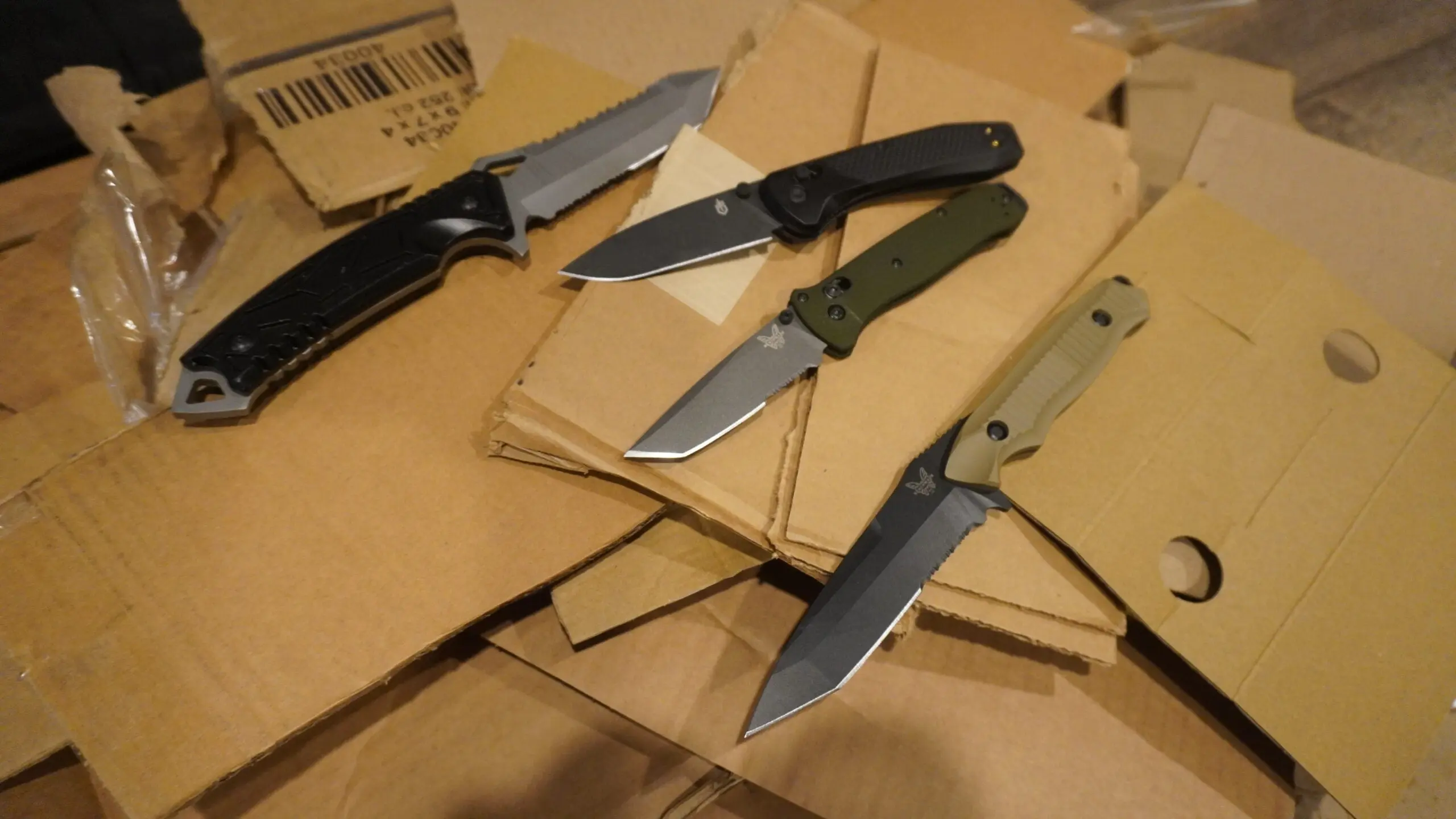
Some of the knives from the test and a pile of cardboard from my edge retention tests. Travis Smola
Best Tactical Knives: Reviews and Recommendations
Best Automatic: Benchmade Claymore
Best Automatic

Specs
Type: Auto Blade
Blade Material: CPM-D2 Blade
Blade Types: Plain Edge, Tanto, Partial Serrated
Blade Length: 3.6”
Pros
Powerful, crisp opening
Excellent edge retention
Great ergonomics
Cons
Handle is a little thick
Price
One of the best Benchmade knives
, the fully automatic Benchmade Claymore has a lot of snap to it once you press the button. Hold on, because it took me by surprise the first time I used it. When it opens, it does it with an authority few knives can match. The button and safety are both extremely crisp and have operated flawlessly thus far. I subjected the CPM-D2 steel blade to a lot of abuse ripping cardboard, more than any other knife here. It took longer than most of the knives I’ve tested to dull even just a little bit and the finish showed zero signs of abuse even after months of use.
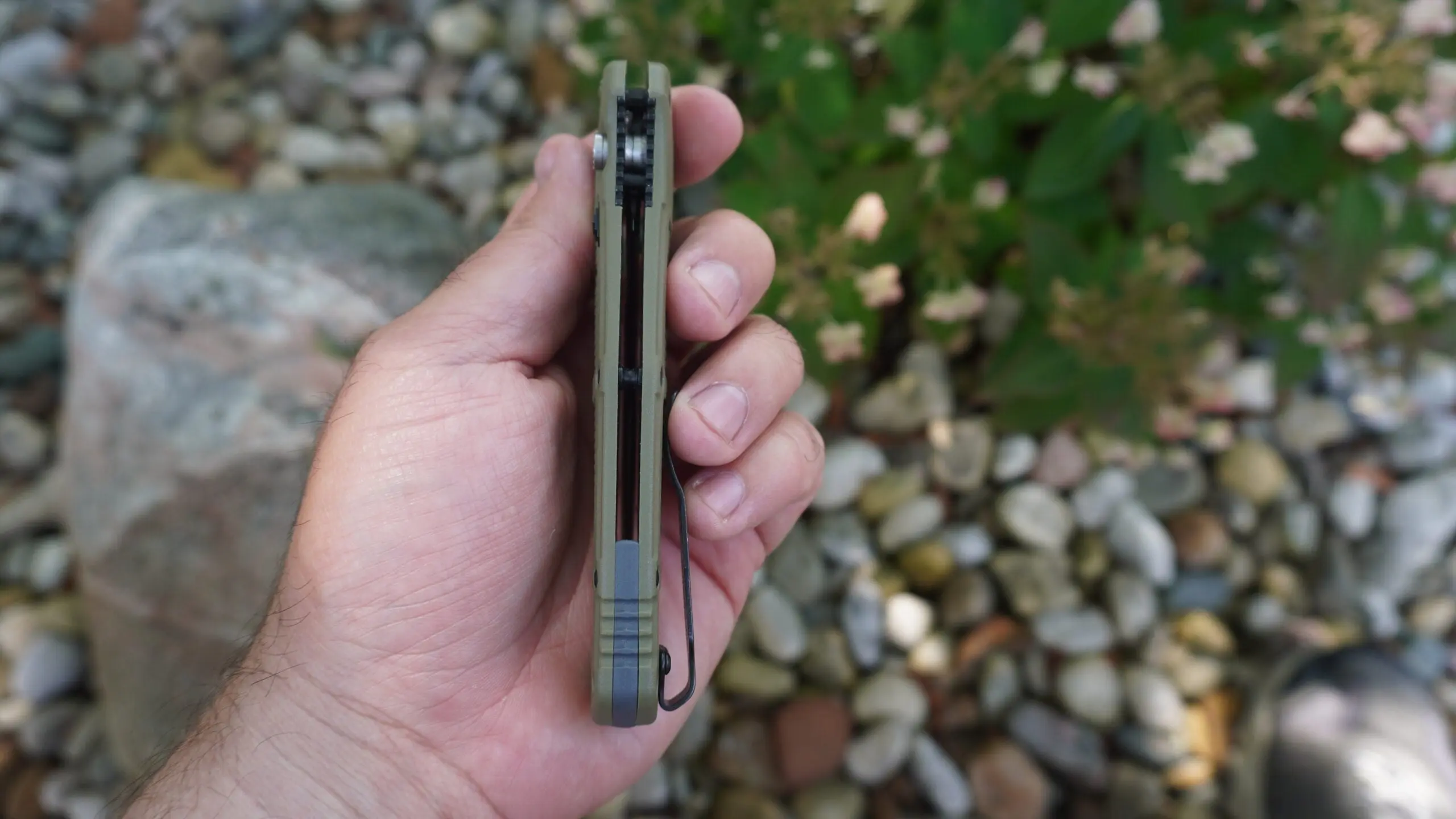
The Claymore is extremely beefy and wide. Travis Smola
I will say the profile of this knife is a little wider than some of the other pocket knives on this list. It’s more noticeable when I carry this one in a pocket. But that’s a minor complaint. The Claymore is incredibly functional and well-constructed and it would be an excellent option for emergency responders or anyone who needs something fast and rugged that can deploy at a moment’s notice.
Best Pocket: Gerber Sedulo
Best Pocket

Specs
Type: Folding
Blade Material: S30V Steel
Blade Type: Drop Point
Blade Length: 3.4”
Pros
Great handle texture
Crisp, easy folding
Quality pocket clip
Cons
Heavy
The Sedulo’s S30V steel blade has an excellent black oxide finish that stood up quite nicely to abuse and the full plain edge has come in handy for many everyday tasks, making it one of the best pocket knives
. I have yet to sharpen it even after breaking down numerous cardboard boxes. It’s still holding an edge and, considering it’s S30V steel, I expect it will for quite some time, too. The tolerances on this knife are enough to let the blade swing freely most of the time under gravity (although you might need to do some adjustments and oiling). I didn’t do any to my test knife but noticed it was a hair too tight to start. After I worked the pivot lock mechanism repeatedly, it started to swing freely, so I think it just needed to be broken in.
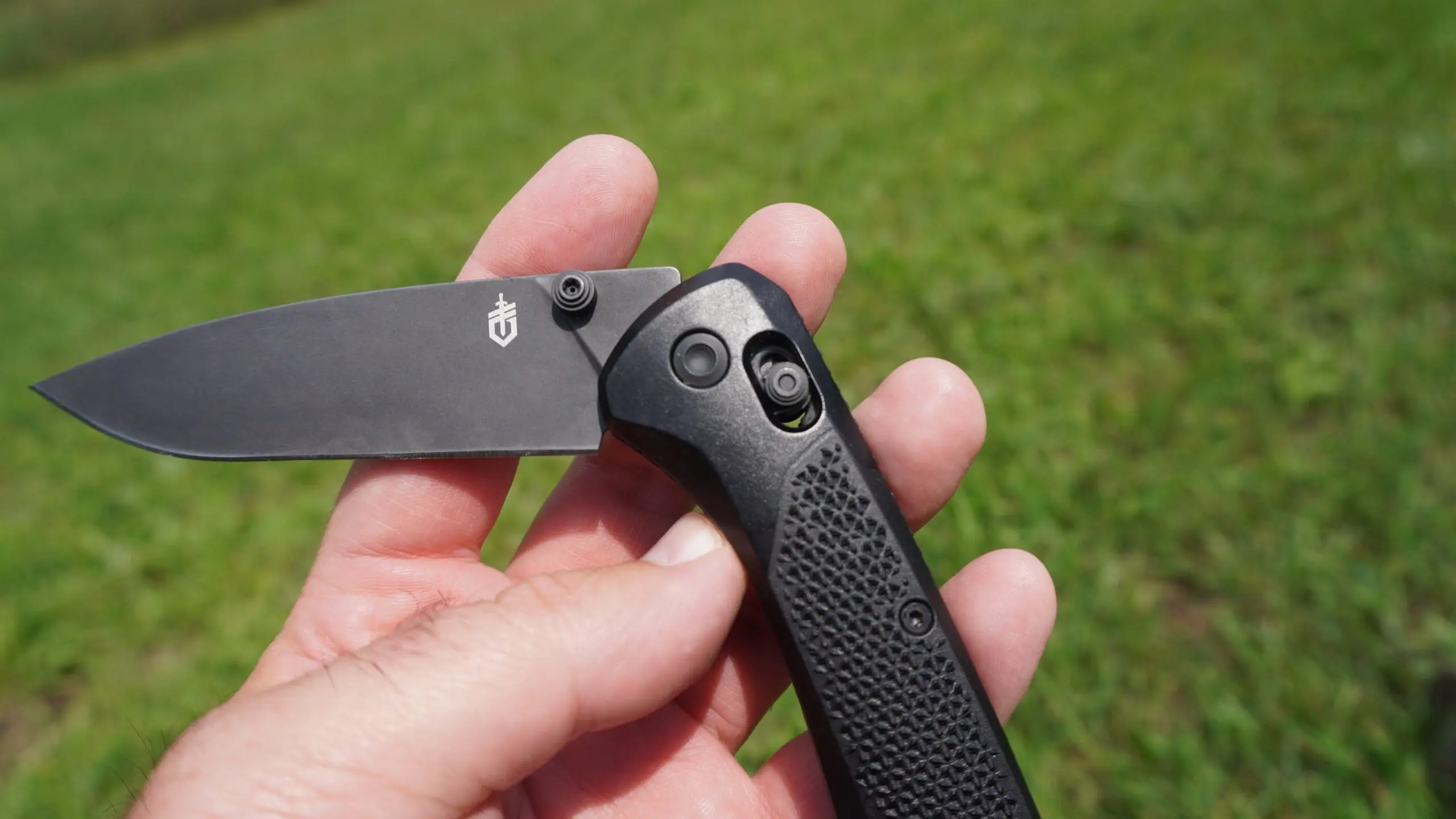
The pivot lock is very easy to operate. Travis Smola
Gerber made this design totally ambidextrous, so it’s very easy to open and close with either hand. This knife is a little on the heavy side at 3.6 ounces. However, I personally like the beefier feel of it in the hand. It just looks and feels like a workhorse. Combine that with a great texture and pocket clip, and this is a solid knife. At $130, it’s great for anyone who wants a higher quality steel without dropping $300 on an EDC knife.
Best Fixed Blade: Ka-Bar Fighter
Best Fixed Blade

Specs
Type: Fixed Blade
Blade Material: 1095 Steel
Blade Type: Clip Point
Blade Length: 8”
Pros
Proven design
Great handle
Incredible factory edge
Cons
Heavy
The classic Ka-Bar is a proven design that served U.S. troops through both World Wars, Vietnam, and Korea. While the design hasn’t changed too much, the company now offers this giant 8-inch clip-point blade with a plain edge that’s as rugged as it is intimidating. Seriously, it’s huge. Think “Rambo” sized with this thing. It has a ridiculously sharp razor edge straight out the box, too. When I tested it, it sliced through a sheet of paper like butter. It also aced my cardboard tests, leaving me with a pile of thin strips without any obvious signs of losing an edge. Not only that, the Ka-Bar effortlessly split through some of the largest pieces of wood in my woodpile through batoning.

The Ka-Bar is a massive, wood-splitting machine. Travis Smola
This knife has the most heavy duty handle I’ve ever seen. It just feels unbelievably solid in the hand—it could probably bash in a window in an emergency if needed. The only downside is that it might be a hair too big and heavy for most practical situations. However, for the hardcore survivalist or bushcrafter who wants something tough that can do literally anything, this is an excellent choice.
Best Assisted: CRKT M16
Best Assisted
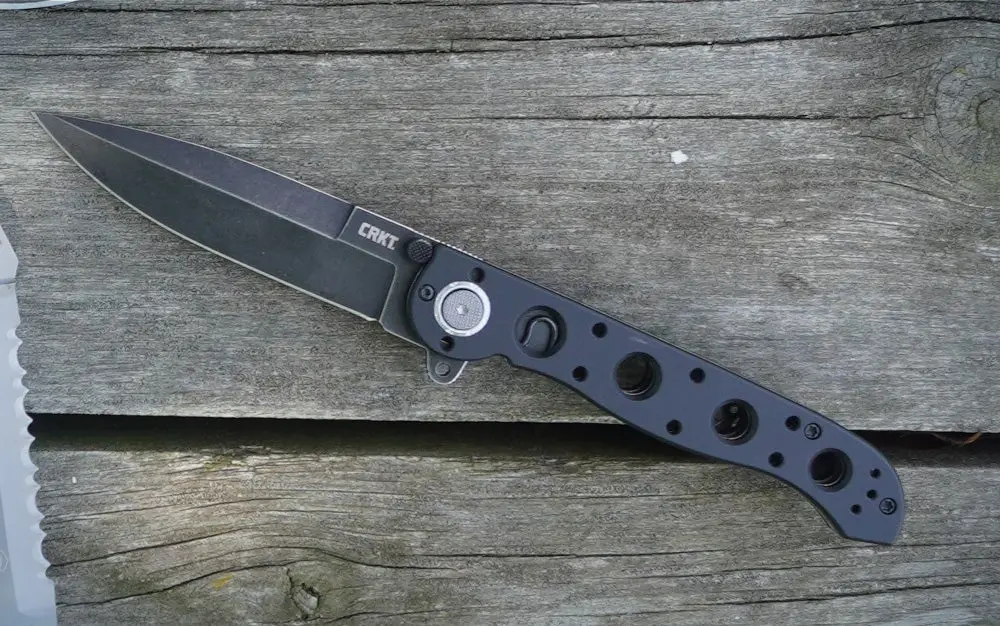
Specs
Type: Assisted Opening
Blade Material: 8Cr13MoV Steel
Blade Type: Drop Point
Blade Length: 3.13”
Pros
Affordable
Impressive tolerances
Great control and feel
Cons
Button is a little mushy
The CRKT M16 is a nifty knife made of 8Cr13MoV steel, which is slightly lower quality but surprisingly easy to sharpen. It also means you won’t sweat it if you break it or lose it. Columbia River Knife and Tool just continues to impress me with the sharpness and edge retention of their blades straight out of the box. The finish held up nicely during the cardboard ripping test. The frame lock feels extremely solid, and I experienced no issues with play in the blade during my testing. The flipper opens the blade fast and efficiently. It’s not the fastest assisted blade I’ve ever tested, but it’s going to deploy quickly in an emergency situation.
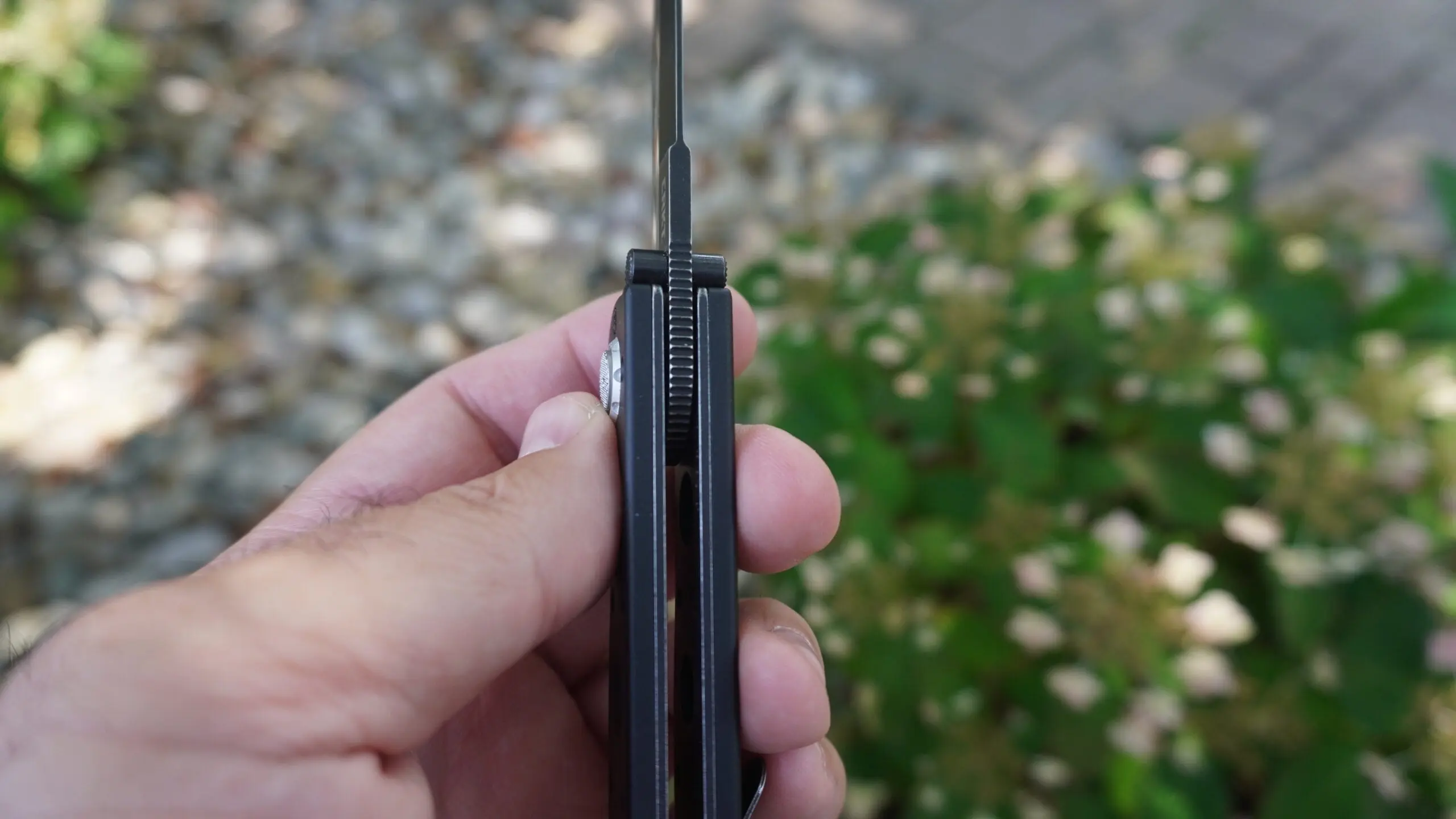
The M16 has a nice profile that fits the hand comfortably, and carries easily in a pocket. Travis Smola
This knife has recently become one of my go-to EDC blades due to how well the frame and handle fit my hand. It gives a lot of precision control to the tip of the drop point. The only real downside I could find is that the button to release the frame lock feels a little mushy. It’s not a big deal for me, but I know some people like these components to have a crisper feel. Although I should also note the tolerances are excellent. The blade swings freely on gravity alone with the push of the button. That kind of performance is surprising for a blade in this price range. You’ll be hard-pressed to find another blade that performs like this for only $50.
Best Carry: Benchmade Bailout
Best Carry
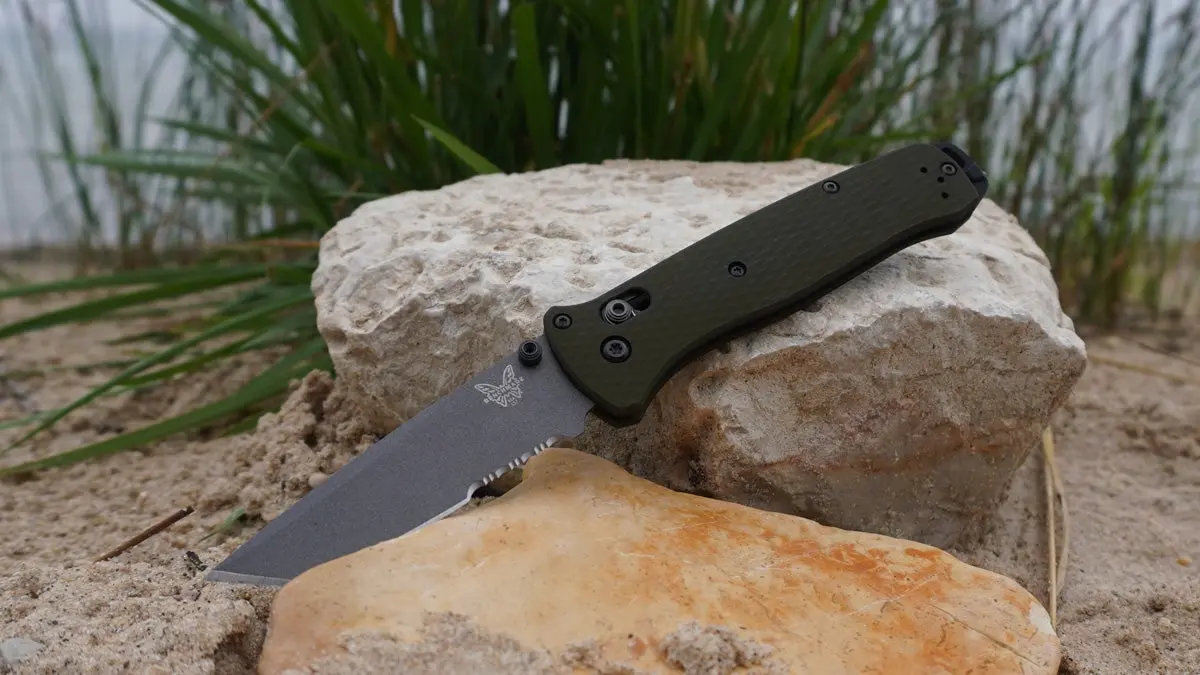
Specs
Type: Folding
Blade Material: CPM-M4 Steel
Blade Type: Tanto, Partially Serrated
Blade Length: 3.38”
Pros
Incredibly light and thin
Extremely sharp
Extremely cool looks
Cons
Tanto blade isn’t great for everyday tasks
The thing that strikes me the most about the Benchmade Bailout knife is how ridiculously slim and light it is. If you’re sick of thick knives that are uncomfortable to carry by the pocket clip, the Bailout is one to consider. It’s the thinnest pocket knife I own. Just be careful. The Bailout only weighs 2.4 ounces, so it’s easy to forget it’s in your pocket.
This knife also has an incredibly rugged CPM-M4 quality steel blade. The sharp edges effortlessly breezed my cardboard tests. You won’t need to sharpen this one for a while. The fact that it has a Cerakote finish to protect against corrosion is a bonus. The finish showed absolutely no wear signs after my testing.
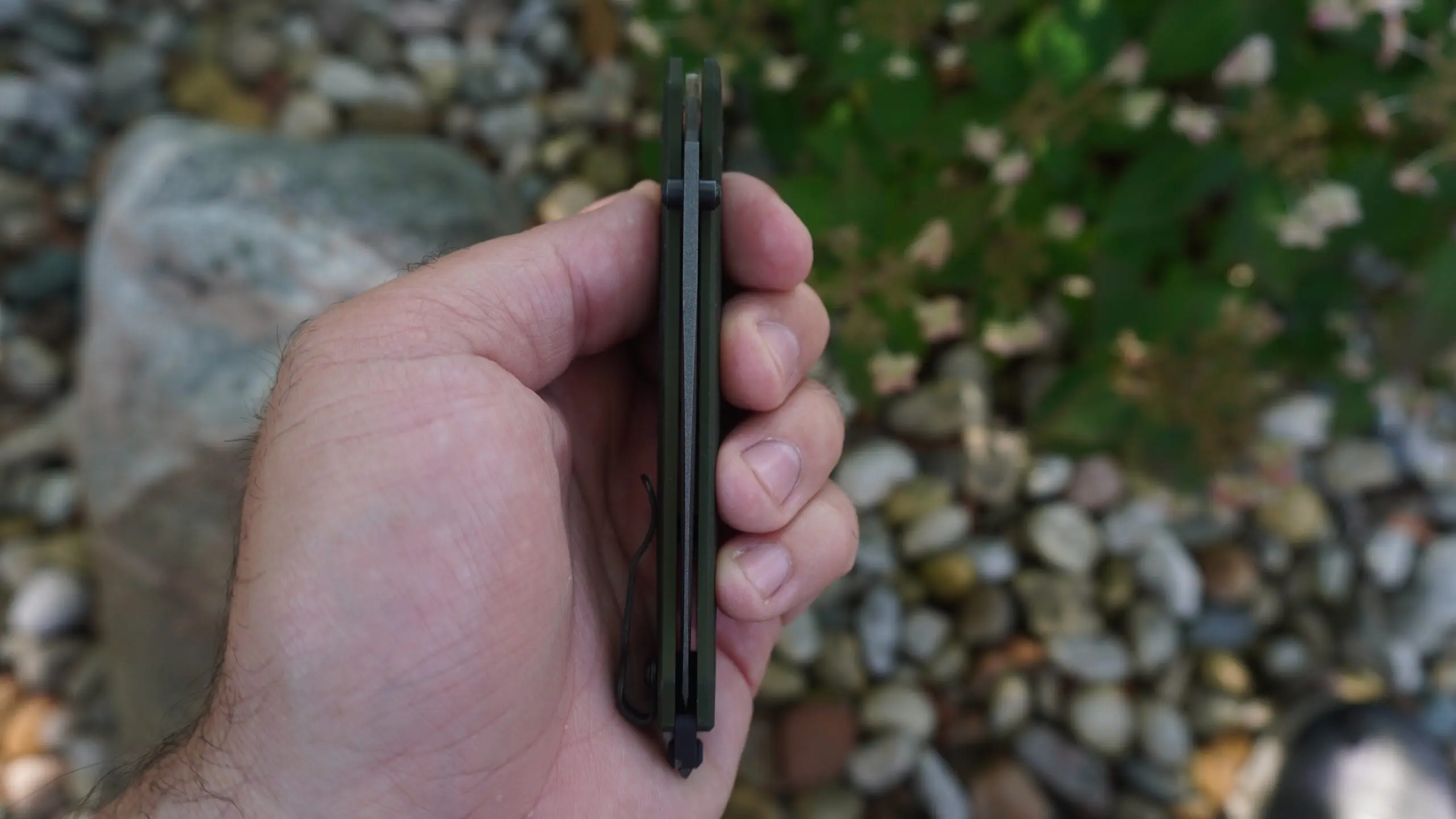
The Bailout has a ridiculously thin profile that allows it to slip in a pocket easily. Travis Smola
The texture of the aluminum handle also makes it very easy to get a secure grip. The Bailout also has a small glass breaker which is a nice bit of extra peace of mind. One never knows when that will come in handy.
I know not everyone is a Tanto blade fan because of the functionality for certain everyday slicing tasks. But I still found this knife functional as an EDC. I especially liked the folding and locking mechanisms, which are smooth and crisp every time. The tolerances were excellent straight from the factory. If you want a folding knife that can effortlessly open and close with one hand, this is it.
Best Budget: Reapr Javelin Fixed Blade
Best Budget
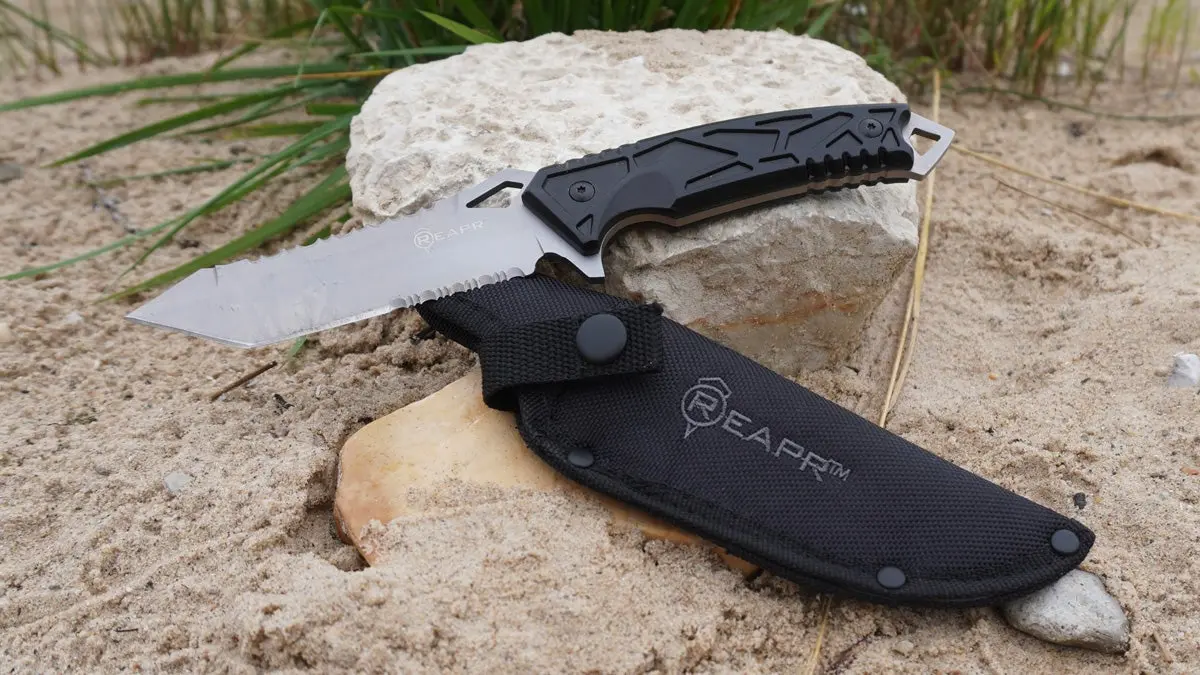
Specs
Type: Fixed Blade
Blade Material: 420 Stainless
Blade Type: Tanto, Serrated
Blade Length: 5”
Pros
Incredible price point
Surprisingly rugged
Great serrations
Cons
Sheath isn’t great
Handle could use just a bit more grip
Reapr is a newer brand I only recently became familiar with. Although it has a price point of just $30, the Javelin is surprisingly robust. The knife has a solid backbone thanks to the full tang, and it feels like you can put a ton of leverage on it. It passed the wood batoning test with flying colors, so it’s plenty durable. The double serrations feel good and they’ll effortlessly cut through small branches and limbs.
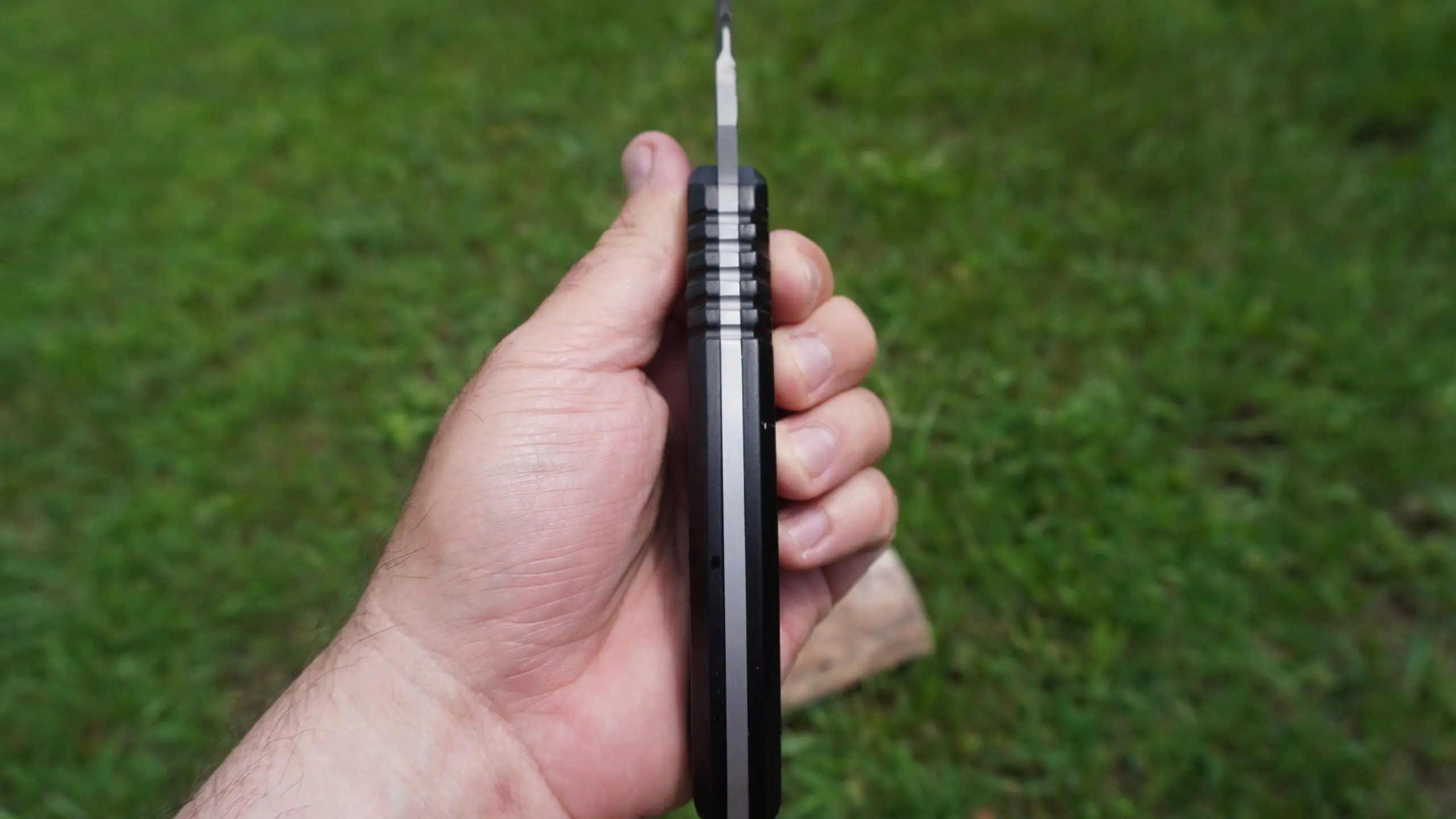
The Javelin’s thick blade can take a lot of abuse. Travis Smola
For the price, the Javelin has a lot going for it and you get two serrated edges in one. If that isn’t enough, there’s a bonus emergency glass breaker. The length of this knife also feels just right for the weight. I think this could double nicely as a bushcraft or camping knife
. It would be a good one to throw behind the seat of a truck for emergencies.
My only real complaints are the sheath quality and the handle. The handle could have used a bit more texture for dexterity. It’s something that you could probably easily remedy with a little grip tape.
Best Made in USA: Benchmade Nimravus
Best Made in USA
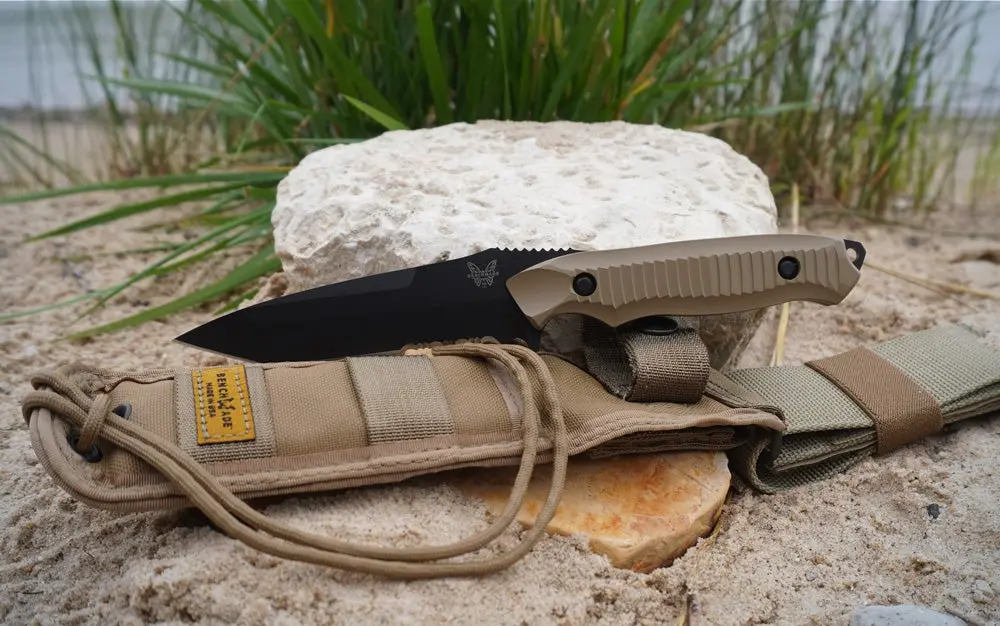
Specs
Type: Fixed Blade
Blade Material: 154 CPM Steel
Blade Type: Tanto, Partial Serrated
Blade Length: 4.5”
Pros
Extremely rugged
Quality sheath
Great grip and balance
Cons
Price tag
Benchmade designed the Nimravus to be an extremely rugged fixed blade knife. The stout backbone was immediately apparent from the first time I picked it up. But I still decided to push the durability a bit. I subjected the blade to a wood batoning test during which it effortlessly split several hard dry logs. This left some marks in the 154CM steel, but the knife is a workhorse, not a show piece. The factory edge on this blade is extremely impressive. My cardboard tests usually start taking the edge off a blade rather quickly, but the Nimravus is an exception.
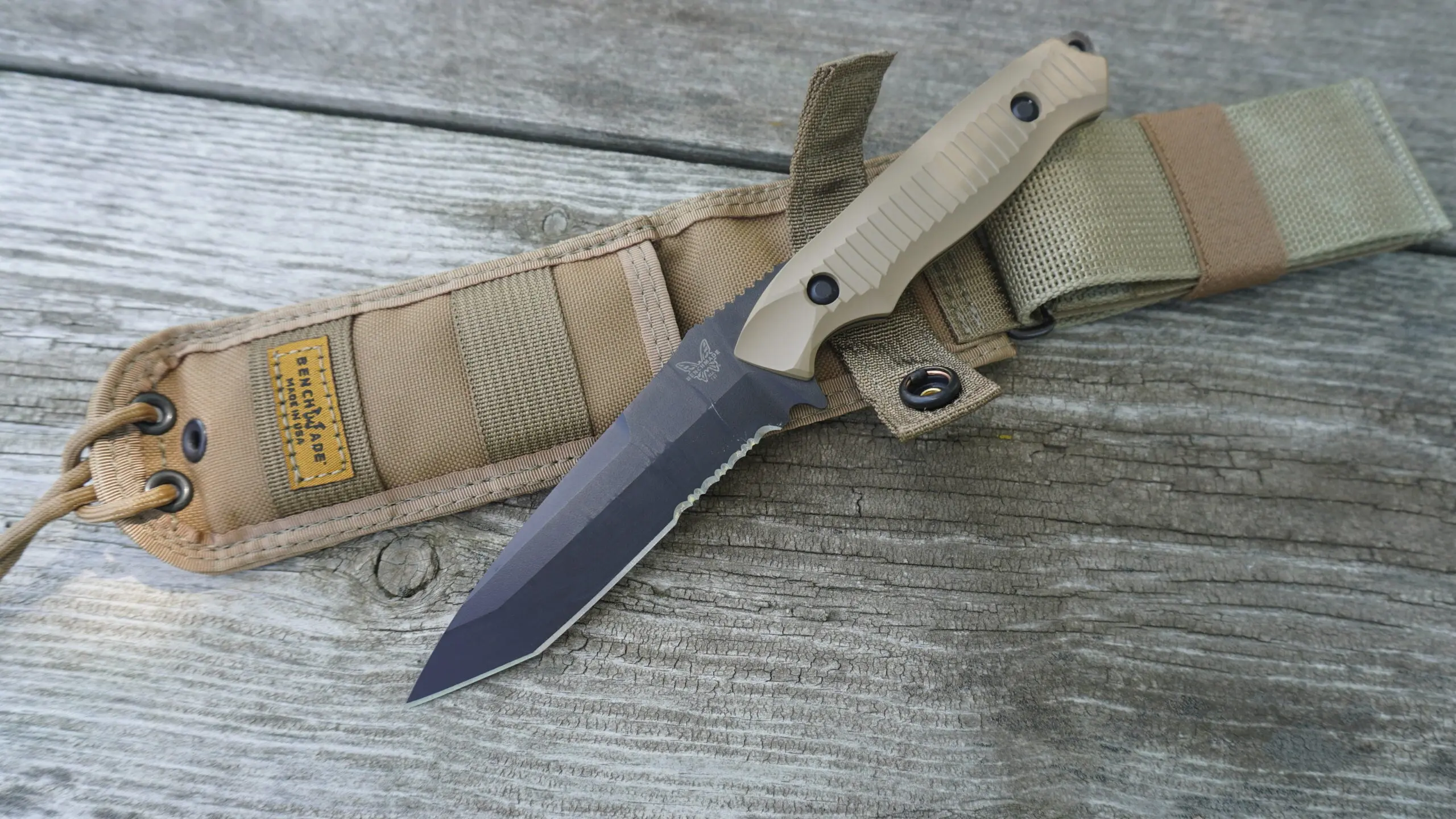
The sheath for this knife is as rugged as the knife itself. Travis Smola
The only real downside to this knife is the $225 price tag. It’s an expensive knife, but the price of admission is worth it based on the construction and edge retention. It feels like something that could get run over by a tank and keep kicking. This knife is also packed with one of the nicest sheaths I’ve seen included with a fixed blade. Benchmade made it MOLLE-compatible for a little extra functionality.
What to Consider When Choosing a Tactical Knife
Tactical knives are extremely versatile, but it’s a good idea to think about exactly what you’ll need based on intended use. There’s a bevy of steel types, grips, and blade designs out there all meant for different types of tactical situations. These are the main considerations when choosing a knife:
Serrated vs Plain Edge
While many tactical knives come with multiple edge options, most knife users probably aren’t going to need more than a plain edge. We like a plain edge for more precise tasks because it produces the cleanest cuts and is the easiest to clean and maintain. Even a beginner can easily re-sharpen a plain edge using a traditional knife sharpener
.
Serrated blades have the appearance of a saw blade and produce much more jagged cuts. Expect a lot of fraying with ropes and cords. These blades are better for things like small branches and wood where a smooth edge isn’t needed. Emergency responders typically prefer a serrated blade because it will quickly cut through a heavy seatbelt or other heavy fabric.
The downside to serrations is that the individual teeth are hard to sharpen without specialized tools. Sharpening difficulties aside, I personally like serrations for a variety of bushcraft tasks. Serrations also do an incredible job field dressing
big game animals. They are perfect for slicing through thick tendons and other tough parts of the carcass.
Blade Types
The two most common tactical knife blade types are drop point and Tanto blades. With a drop point, the spine eventually slopes down towards the tip of the blade. A Tanto blade is a Japanese design with a sharp angle near the tip. Drop point blades are often stronger and more versatile for a variety of everyday cutting and slicing duties. While Tanto blades are better designed for piercing and chopping, they are somewhat limited in their usefulness as an EDC knife.
Another popular blade type is clip point. This is arguably the most common knife blade regardless of style. Clip points have a portion of the top of the blade seemingly “clipped” out in a semi-circular shape. It results in a thinner tip that pierces better and with precision for more delicate tasks. The downside is that clip points are much more prone to breakage than drop points or Tanto blades.
Auto, Assist, and Folding Mechanisms
When it comes to folding knives, most of the tactical ones have a mechanism to deploy the blade. Assisted opening blades have a small, raised flipper that the user presses to “flip” the blade out. This type of knife is made with or without a spring to help deploy the blade faster. Then there are automatic knives which deploy instantly through the press of a button or lever.
Fully automatic knives are legal in 44 states according to the American Knife & Tool Institute
, although some states have restrictions on carrying them. The laws that cracked down on auto knives were mostly enacted in the 1950s during the height of fears over “greaser” subcultures. The good news is that many states have started to realize how antiquated these laws are and some have started to roll these laws back. Still, some knife manufacturers will only sell auto knives directly to law enforcement or military personnel.
FAQs
Q: Should I get a 15 or 20-degree angle knife?
Most tactical knives are built with a 20-degree angle. Knives with a 15-degree angle are usually reserved for chef’s knives that are built for delicate slicing. Subsequently, a knife with a 20-degree angle is built with a more rugged edge that’s better for bushcraft and emergency scenarios.
Q: What’s the best size of a tactical knife?
The best size depends on the case use. Larger fixed blade knives that are at least 5 inches long are great for emergency and survival situations. However, they are not good for everyday carry because they are heavy and do not conceal well. An ideal EDC knife has a blade between 2 to 4 inches long that folds and easily slips into a pocket.
Q: How long will a tactical knife last?
Most knives will last years if not decades. However, there are many factors involved: steel quality, amount of use, and exposure to corrosive elements that all play a part. A knife that you use every single day and sharpen regularly will wear down faster than one that spends most of its life in a drawer. Learning how to sharpen correctly will help significantly so you can put an edge back on while taking off less material.
Best Tactical Knives: Final Thoughts
Best Automatic: Benchmade Claymore
Best Pocket: Gerber Sedulo
Best Fixed Blade: Ka-Bar Fighter
Best Assisted: CRKT M16
Best Carry: Benchmade Bailout
Best Budget: Reapr Javelin Fixed Blade
Best Made in USA: Benchmade Nimravus
The word tactical has become something of an umbrella term for a whole host of knives. Thus, it’s hard for us to pick a best overall because so many different types of knives can be defined as “tactical” in nature. Although after my extensive testing, I feel all the blades on this list are more than worthy of your hard-earned money. Many of these best tactical knives are ones I carry and use on a near daily basis.
Why Trust Us
For more than 125 years, Field & Stream has been providing readers with honest and authentic coverage of outdoor gear. Our writers and editors eat, sleep, and breathe the outdoors, and that passion comes through in our product reviews. You can count on F&S to keep you up to date on the best new gear. And when we write about a product—whether it’s a bass lure or a backpack—we cover the good and the bad, so you know exactly what to expect before you decide to make a purchase.
![Field & Stream [dev]](https://images.ctfassets.net/fbkgl98xrr9f/1GnddAVcyeew2hQvUmrFpw/e4ca91baa53a1ecd66f76b1ef472932b/mob-logo.svg)




